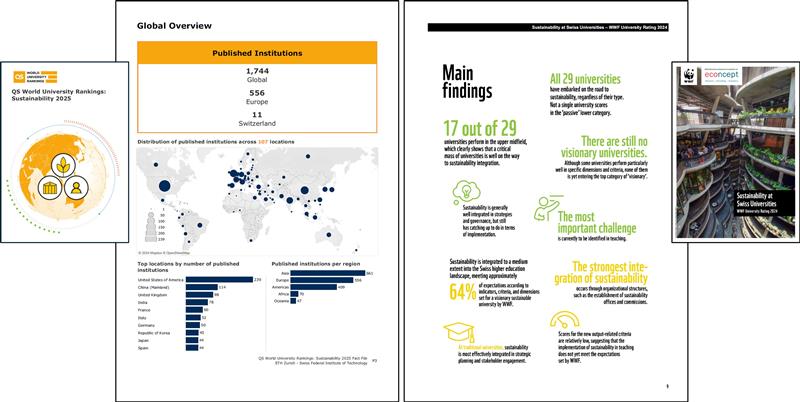Sustainability rankings for universities: what can we learn from them?
ETH Zurich's sustainability efforts were evaluated twice last month: the “WWF University Rating 2024” and the “QS World University Rankings: Sustainability 2025” show a mixed picture. An analysis.

In the “QS World University Rankings: Sustainability 2025” published today, ETH Zurich is ranked second worldwide and is thus rated as the most sustainable university in Europe. This comes just one month after the publication of the Swiss-wide WWF University Rating 2024, which gave ETH a middle ranking for its sustainability efforts. In addition, the ranking has changed in both lists. The results provide food for thought and raise questions.
What are the reasons for the different assessments? How can ETH Zurich benefit from them? And what conclusions can be drawn from the analyses to further strengthen the sustainability culture at universities?
Institutional Research, ETH Diversity and ETH Sustainability were involved in the preceding data preparation for the two external evaluations. Now they have looked at the results of the two analyses together with the Corporate Communications department, because the rankings often generate considerable attention.

“We consider the internal discussions about the results of the evaluations to be important in general and very fruitful in the context of sustainability reporting in particular.”Stephan Zimmermann, Head of Institutional Research
Stephan Zimmermann from Institutional Research explains: “ETH Zurich made a conscious decision to actively input data for the two rankings and ratings in 2024. On the one hand, this was done to understand the impact of the methodological changes made by both agencies since the last publication. On the other hand, we consider the internal discussions about the results of the evaluations to be important in general and very fruitful in the context of sustainability reporting in particular.”
Rankings: A Methodological Co-Creation
External agencies create sustainability ratings and rankings for universities with the intention of raising awareness of their ecological and social impact, benchmarking, reviewing sustainability strategies and measures, or recognizing their contributions to the United Nations' Sustainable Development Goals. In doing so, the external agencies are dependent on the scientific expertise and cultural diversity of the universities they evaluate for the methodological development of their ratings and rankings.
ETH Zurich is represented on the external page Advisory Board of the QS World University Rankings. For many years, it has been in close contact with WWF as part of various network activities in the field of external page education for sustainable development and, in general, for a sustainable university landscape.
Sustainability in Swiss higher education
The “WWF University Rating 2024”, which has been conducted four times since its first edition in 2017, shows that sustainability has become an integral part of Swiss higher education. On the one hand, this is due to the structural funding provided by the 2016-2020 and 2021-2024 ERI messages, which made sustainable development a core task of Swiss universities. On the other hand, the analyses carried out by WWF in collaboration with econcept AG have also played a role. The explicit goal of both organizations in this year's rating is to encourage universities in their “third mission” - beyond research and teaching - to take an active role in positive social change.
The current rating shows that all 29 Swiss universities are working on this. Most are in a broad midfield, while four universities are described as “ambitious”. ETH Zurich has lost some points in the rating compared to the 2021 rating (see also ETH-News 2021) and currently belongs to the “upper midfield”.
According to WWF, the assessment considers the specific type and characteristics of the universities, so direct comparisons between them are only possible to a limited extent. “We therefore recommend assessing the rating not as a direct comparison of universities, but rather as a benchmarking with an ideal of a sustainable university in mind, as defined by WWF,” he writes in his accompanying external page media release (german/french/italian). However, methodological changes make it difficult, if not impossible, to compare the 2021 and 2024 assessments. So, it remains a snapshot.
Existing fields of action confirmed
The “QS World University Rankings: Sustainability 2025” was conducted for the third time. Here, too, there have been methodological changes compared to last year's ranking, in which ETH Zurich was external page ranked 18th worldwide (8th in Europe). Regardless of any criticism of methodological approaches and intentions, fields of action can be derived from the two assessments by WWF and QS.

“We appreciate such rankings as a benchmark for improving our efforts in the area of diversity, equality and inclusion.”Hanna Wolf, Staff of ETH Diversity
The QS Sustainability Ranking sees potential for improvement in the areas of equality, diversity and inclusion (EDI), which underlines the importance of further developments in the area of social sustainability. Hanna Wolf from ETH Diversity says: “We value such a ranking as a benchmark for improving our efforts in the area of diversity, equality and inclusion, even though these topics depend heavily on structural and societal factors that are beyond the control of an individual university.”
Furthermore, both QS and WWF point out weaknesses in the area of sustainability governance and in the promotion of sustainability skills. In fact, these fields of action are of central importance for the development of ETH Zurich and are currently part of ongoing transformation processes.
Sustainability is given high priority in the new institutional priorities, and the development plan 2025-2028 as a newly formulated strategic basis also testifies to a broadly anchored understanding of sustainability at the university. In combination with the transformative character of the ETH Net-Zero program and the PAKETH project, these developments will also strengthen interdisciplinary skills in sustainable development throughout ETH. In the area of sustainability governance, preparations have been underway for some time for the establishment of a “Sustainability Council”. This will support the strategic consideration of sustainable development in addition to the management by the Vice President for Infrastructure and Sustainability and the ETH Sustainability Office (Internal News article on a new name for VPIN).
Swiss universities are joining forces
Rankings and ratings classify universities according to certain criteria and make them seemingly comparable. Because different rankings look at different aspects and use individual criteria, they can come to different conclusions on supposedly similar topics. Even within a single ranking, direct comparisons are often less meaningful than suggested if evaluations are individualized, oversimplified or the methodology changes over time. Nevertheless, these rankings can give us valuable insights into how our efforts are interpreted by outsiders.
“Comprehensive sustainability reporting is a central tool in the development process towards social and ecological responsibility.”Sebastian Kahlert, Sustainability Manager at ETH Sustainability
Ultimately, the greatest possible transparency regarding how the self-imposed goals are achieved is crucial for the credibility of a sustainable university. Sebastian Kahlert from ETH Sustainability says: “It is important that we see comprehensive sustainability reporting as a central tool in the development process towards social and ecological responsibility and not simply carry it out as an end in itself."
In this respect, this year's WWF University Rating (2024) triggered a new dynamic among Swiss universities, which is also leading to greater collaboration in rating and reporting. Together with the Zurich University of the Arts (ZHdK) and the Zurich University of Teacher Education (PHZH), ETH Zurich organized a well-attended workshop on this topic at the Sustainable University Day (SUD) on November 12, 2024.
The result: Swiss universities are interested in developing a common understanding of reporting standards that enables all actors to enhance their sustainable impact. An overarching working group will now advance the project and thus also strengthen the external page sustainability culture at Swiss universities.
